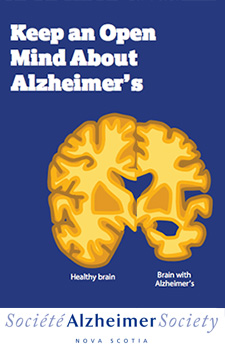AlzheimerтАЩs disease may not always be top-of-mind for many students, but itтАЩs rare to find someone who hasnтАЩt been touched by the disease through the diagnosis of a parent, grandparent or other relative.
 Every January is marked as AlzheimerтАЩs Awareness Month, with Alzheimer Societies across Canada engaging people in discussions about the disease.
Every January is marked as AlzheimerтАЩs Awareness Month, with Alzheimer Societies across Canada engaging people in discussions about the disease.
тАЬWe have a campaign, and its purpose is to increase awareness, increase education, reduce stigma and make people aware of services available,тАЭ explains Wenda MacDonald (PhDтАЩ89) manager, client services/research liaison with the Alzheimer Society of Nova Scotia.
This yearтАЩs lineup includes a тАЬfantastic array of public offerings around some books and moviesтАЭ adds MacDonald. Many of those events are being hosted in partnership with (Faculty of Medicine), an interdisciplinary research team at ║┌┴╧│╘╣╧═Їfocused on the intersection of health, bioethics and public policy. includes a public lecture and two film screenings with panel discussions featuring community experts, including several Dal faculty.
тАЬThere is still a lot of stigma around the diseaseтАЭ says Linda Bird, director of programs and services with the Alzheimer Society of Nova Scotia. тАЬSometimes it even stops people from seeking help,тАЭ adds MacDonald. The two are familiar with the consequences of the stigma, hearing from clients about customer service personnel calling persons with dementia тАЬstupidтАЭ if they forget something, which causes that person to isolate themselves further.
Addressing stigma
Darce Fardy has been fortunate to not experience much of this stigma, likely because of the openness with which he speaks about his AlzheimerтАЩs disease. As a lifelong journalist who spent 40 years with the CBC, when he was diagnosed he said to himself, тАЬThis seems to be a good story, I must write about it.тАЭ He now writes columns in the Chronicle Herald about his experiences, articles which have gained him a significant following. Fardy says he receives emails from across the country, mostly from families of persons with dementia who find the columns very helpful.
Fardy will be on on January 18 at the QEII Royal Bank Theatre on the main floor of the Halifax Infirmary (1796 Summer St. entrance). As part of a moderated discussion, he will be joined by fellow panelist Dr. Melissa Andrew, an associate professor of geriatric medicine at ║┌┴╧│╘╣╧═Їand a member of the Alzheimer Society of Nova ScotiaтАЩs research advisory committee.
The other events include on January 11 with a panel discussion (also at the Royal Bank Theatre), , a renowned medical anthropologist and the Marjorie Bronfman Professor Emerita in Social Studies in Medicine at McGill University, on January 25 at Paul O'Regan Hall (Halifax Central Library, 5440 Spring Garden Rd.).
Fardy says heтАЩd never heard about Alzheimer's disease in his youth, тАЬbut all of our grandparents were what we used to call 'out-of-it' towards the end.тАЭ
Dr. Andrew still sees some signs of this approach today: тАЬSome cultures tend to normalize dementia,тАЭ she explains, тАЬsaying itтАЩs just a part of getting old, and others would medicalize it more [and are willing to treat it]. Sometimes weтАЩll see patients coming in at a very late stage and not that there is a cure but there are things that could have been done to mitigate symptoms, or we could have provided services.тАЭ
Challenge and community
The progress made since Fardy was a child has been extraordinarily positive. тАЬThere are pills to take. But there are also things you can do. Stay active, which I do. And I read a lot, I read two newspapers a day and IтАЩve always got a book going.тАЭ
Bird says one of the major challenges for persons with dementia is тАЬhaving an understanding community.тАЭ She points out that тАЬthe research shows that if you get families involved early in the disease and they start to think about the future, they make better choices and more informed decisions as they go through the disease.тАЭ
тАЬAnd they do have a better quality of lifeтАЭ adds MacDonald. While involving the family helps with the journey there are still challenges in тАЬgetting a cohesive picture of what is happening and what supports there are at all phases along the journey,тАЭ she says. The Alzheimer Society of Nova ScotiaтАЩs work with the provincial dementia strategy seeks to fill these gaps and expand services across the province to better service rural areas.
Eager to learn more about AlzheimerтАЩs disease? or visit the .

